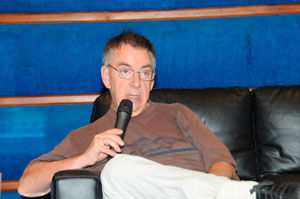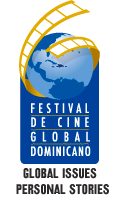
Spanish production manager chats with Dominican filmmakers about the importance of the script and the budget on a panel about "Production Direction."
(Santo Domingo, November 15, 2012). – The Auditorium of the Global Foundation for Democracy and Development was the meeting place where Dominican filmmakers shared the need to develop a good budget to ensure the success of their work with renowned Spanish production manager, Emiliano Otegui.
At present, a good production manager has to know each one of the departments that make up the film in order to prepare the budget and make allocations to each one – “Money doesn’t stretch. If it isn’t properly budgeted it has to be taken from other departments,” commented our panelist.
to each one – “Money doesn’t stretch. If it isn’t properly budgeted it has to be taken from other departments,” commented our panelist.
Otegui emphasizes that the work of the Production Manager is a very lonely task that starts five or six months before the shooting of the film itself. This is the time when the budget will be planned, including a countless number of details that may go unnoticed but that will determine our ability to plan. So, an itemized budget must be prepared, preparing one spreadsheet for each sequence of the film that should encompass special effects, makeup, photography, art, costumes, sound, locations, casting, among other things. This breakdown should be as detailed as possible, requiring the production manager’s involvement and knowledge of each one of the areas.
Once the first budget is labeled “ideal”, it is usually submitted to the parties involved for their approval. Unfortunately one doesn’t usually get everything they ask for, the reality is different. If a director asks you to reduce the budget by 20% during the negotiations, then the project isn’t worth doing.
Then he spoke about the four phases that Production Management encompasses, mentioning: Pre-production, Production, Post-Production and Promotion. Otegui highlighted the importance of not spending more than what we have, as this would affect the development of the remaining phases and he therefore recommends being cautious when dividing up the money between the phases since it is essential not to mix them – “The money gets spent a lot faster than it comes in,” he added.
The Production Manager must maintain continuous communication with the Director, the Scouting Manager and Art Director. These three persons will determine part of the budget spending. The Director will open the door to his tastes or preferences, whether he works with long shots or sequence shots, whether he’ll use cranes, the number of cameras per scene, etc. For his part, the Scouting Manager will search for sites where the filming will take place. In this case Otegui notes that there are three stages to location determination: 1. Do a general search for sites, 2. Determine the feasibility of the space, and 3. Analyze the area in case the setting needs to be modified – “The most expensive thing in a movie is time and the less you move the better,” he explained. Finally, the Art Director will assess the specific needs of the established locations, in this case what will have to be built, modifying interiors, removing antennas or flags, putting in plants, bringing in cars from the era, preparing a cover set (decorated for shooting coverage outside in the case of rain), etc.
During the panel, Emiliano Otegui emphasized the importance of maintaining and respecting the agreements that were made with the Director during the planning of the filming – “The Director must mark from where to where the plans will go, since this, depending on the place, presumes a discussion with the neighbors to remove “x” thing or to cover another thing that, according to the script, is not within the context of the film.”
An average film takes 7-8 weeks of shooting with 40 to 50-hour work-weeks, by which time each area manager already has his budget and the list of requirements for carrying out his work. Therefore he suggests avoiding situations like “I anticipated this but now I need something else.” What cannot be changed is the final budget figure, explains Otegui - and that’s where the negotiations come into it – “You can dispense with trailers for the actors, the top hotels, and many other things. My approach is always, always, always spend the money on screen.” Then, “If you’ve done your job well, there is no reason to be running about or suffering,” stressed Otegui.
In concluding his presentation, the production manager of films such as “Tesis”, “Mar Adentro (The Sea Inside)” or “La lengua de las mariposas (Butterfly)”, allowed a small chat session with those attending the panel, where they discussed various issues such as the minimum budget a director should have to make quality films, digital cinematography, piracy, major investments in sound and image. the allocation of resources with respect to box office issues, the participation of films in international festivals, what is the critical point of a script for the budget, and the impact of Latin American cinema, among other topics.
“For a film to be good it must have three things: a good script, a good script and a good script. If you have a good script in your hands, it’s hard to go wrong.” With this phrase, the “Production Direction” panel led by Emiliano Otegui was concluded.
Others who attended the panel included Rigoberto Pérez, Dominican actor César Olmos, Mexican actor Arap Bethke, and a group of students from the Mauricio Báez high school.









